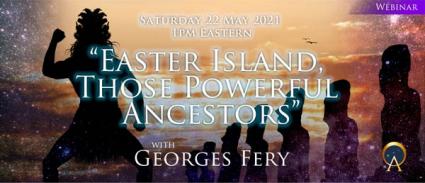
The history of Easter Island is a dramatic example of the clash between faith and
demographics. Throughout humankind’s history, communities mitigated or, as in our case, worsened their environment, and destroyed their food chain. On a large landmass people move with the seasons, weather conditions or away from neighbors’ hostility. Inversely, island migrations are dependent on available land and food collection zones, extended offshore. Observations that may apply to Easter Island, but are insufficient to answer its riddle. The island’s name in the local language, the Rapanui, is Rapa Nui.
Ancient nonliterate cultures recorded their histories as myths and folklore, while their beliefs were dependent on what was perceived as an “Otherworld” of ancestors and “mind-made” deities. This spiritual perception was inherited from the Lapita trailblazers of the Pacific and successive cultures, thousands of years in the past. The mythological past traditionally short on facts, leaves many grey areas in the Rapa Nui ethnological record. The origin of the historical group that settled on the island, points to Mangareva in the Tuamotu archipelago. The easternmost points of human settlement in the Pacific island triangle, however, will be Hawaii and Rapa Nui (900 AD) and New Zealand (1200 AD).
In Rapa Nui, climate, animal migrations from birds to fish, food crops’ success or failure, water supply and other life sustaining needs, were believed to be the exclusive dominion of Make-make. The paramount god was the sole master of mana’s powers, granted or withheld at will to Rapa Nui’s ancestors who, in turn, granted mana to their living family and communities’ heads.
No success or failure, from nature’s reward to joy or sadness, wellbeing or deprivation could happen in this world without mana. The belief in an “Otherworld” as a wellspring of ancestral powers for individuals and families, was then common to most cultures of the Pacific. With this mythological perception of life and the support from their ancestors, the Rapanui could not possibly understand the cumulative cause and effect of their actions, nor their failures. Did Make-make turn his back and withheld mana from the ancestors?
[[{"type":"media","view_mode":"media_original","fid":"14873","attributes":{"alt":"Georges Fery","class":"media-image","height":"229","style":"width: 220px; height: 229px; float: left; margin: 10px;","typeof":"foaf:Image","width":"220"}}]]
Georges Fery is a tri-lingual freelance writer and photographer based in Dallas, Texas. He has travelled extensively over the last 35 years from Europe to Africa and the Americas. His website www.georgefery.com focuses on the history of the Americas up to the arrival of the Europeans. His articles are dedicated to research and papers about the Maya, past and present, as well as other Mesoamerican cultures and those of the South American continent. He is a fellow of the Institute of Maya Studies www.instituteofmayastudies.org, Miami, FL, the Royal Geographical Society www.rbg.org , London, UK and also a member in good standing of the Maya Exploration Center www.mayaexploration.org. He is a member of the NFAA-Non Fiction Authors Association, nonfictionamericanwritersassociation.com
Austin, TX and the Archaeological Institute of America www.archaeological.org , Boston, MA.
